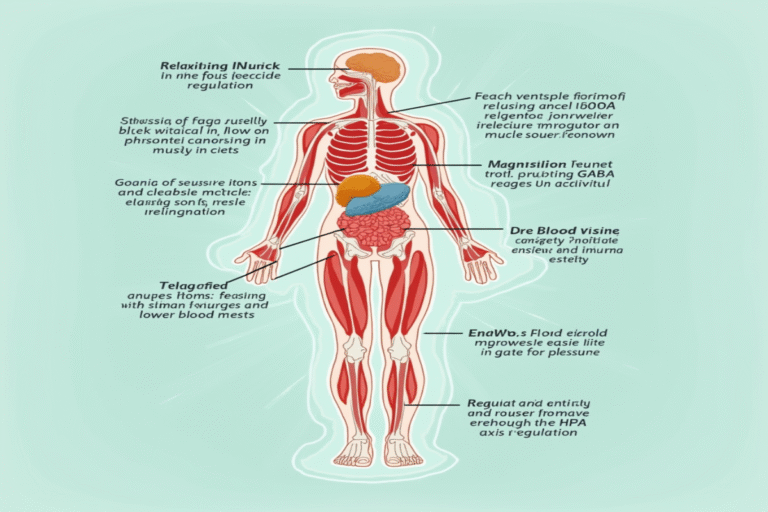Magnesium might seem like just another mineral, but inside your body, it plays a crucial role in helping you relax—both physically and mentally.
The Muscle Relaxation Mechanism
When your muscles contract, calcium ions flow into muscle cells, triggering the sliding of protein filaments (actin and myosin) and causing the muscle to contract. Magnesium acts as a natural calcium blocker. It competes with calcium for binding sites in the muscles, essentially telling calcium it’s time to relax. By blocking some calcium channels and regulating calcium entry, magnesium helps prevent excessive contractions that lead to cramps, spasms, and tension.
NMDA Receptors: Magnesium’s Role in the Brain
Magnesium has an important job in your brain as well. It sits at NMDA receptors, which are activated by the neurotransmitter glutamate and increase neural excitability. Magnesium ions block these receptors at normal resting potential, preventing them from becoming overactive. Without enough magnesium, these receptors can fire too easily, leading to overstimulation and potential neuron damage—a process known as excitotoxicity.
The Neurotransmitter Connection
Magnesium is also essential for producing GABA (gamma-aminobutyric acid), the brain’s main calming neurotransmitter. GABA acts like a brake pedal for brain activity, helping promote calmness and relaxation. Low magnesium can reduce GABA production, making it harder for your brain to slow down, which can increase anxiety and stress.
The ATP Energy Connection
Magnesium is involved with ATP (adenosine triphosphate), the body’s main energy molecule. The biologically active form of ATP is actually bound to magnesium (Mg-ATP). This partnership helps regulate energy use in muscle cells. After muscles contract, magnesium is essential to help them relax and recover efficiently.
Blood Pressure and Vascular Relaxation
Magnesium promotes vasodilation, or the widening of blood vessels, which improves blood flow and can lower blood pressure. It does this by relaxing the smooth muscles in blood vessel walls. Better circulation means more oxygen and nutrients reach your brain and other tissues, supporting relaxation and overall brain function.
The HPA Axis: Your Stress Response System
Magnesium also helps regulate the hypothalamic-pituitary-adrenal (HPA) axis, which controls how the body responds to stress. It helps manage cortisol release, reducing the risk of overproduction of stress hormones that can leave you feeling anxious. Studies have shown that magnesium deficiency can make the body overreact to stress, increasing anxiety and nervousness.
Altogether, magnesium’s influence on muscle relaxation, brain activity, blood flow, and stress response shows how important this mineral is for maintaining balance in the body. When magnesium levels are optimal, your body has a natural system for keeping tension and stress in check, supporting both physical relaxation and mental calm—the result of millions of years of evolution and a subject of ongoing scientific research.





